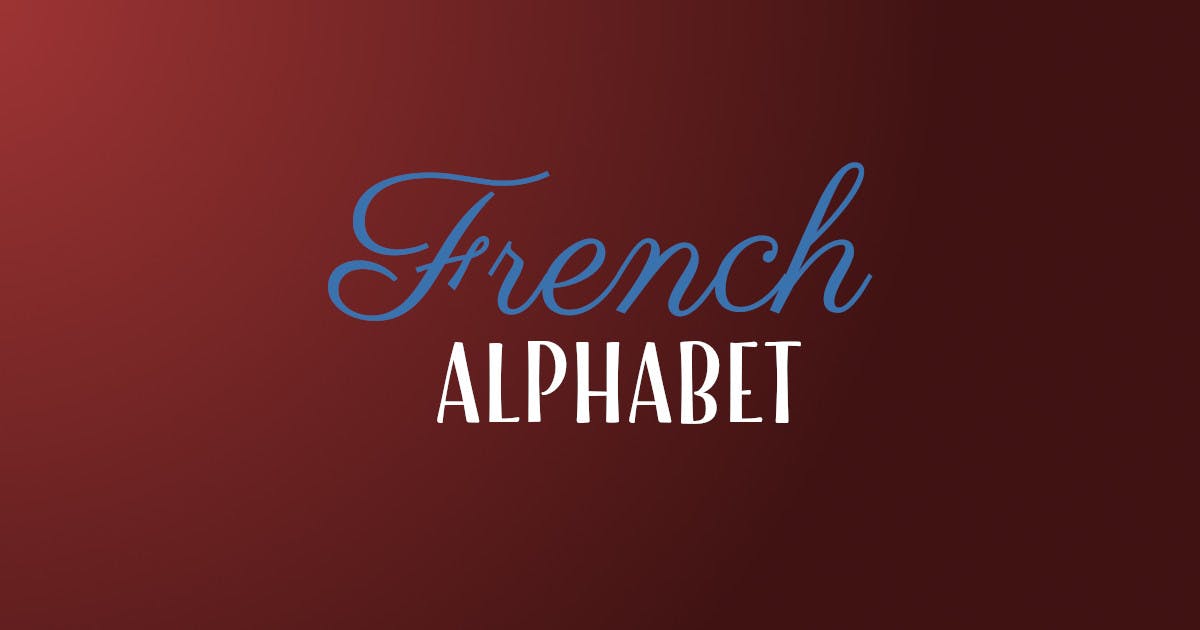Learn The French Alphabet (Complete Guide)
The French alphabet is essentially identical to the English alphabet but the difference lies in its pronunciation.
Easily the biggest challenge for English speakers trying to learn French is getting the pronunciation of the alphabet right.
For every seemingly familiar word that looks like something easily pronounced, dangers abound.
How to pronounce the French alphabet properly
Here's a quick and dirty guide to pronouncing French sounds the correct way.
It covers the vast majority of cases, but there are exceptions. Please refer to this page as we move on to further lessons.
Even simple letters of the French alphabet are anything but simple — but never fear, with a little practice it will come naturally.
Pay special attention to the r and u since they are the letters most likely to cause difficulties.
The French Alphabet
| French Sounds | Sounds Like the: | In: | French Examples (Translation) |
|---|---|---|---|
| a | a | r[a]t | bras (arm), chat (cat) |
| b | b | [b]utter | bateau (boat), bête (beast) |
| c before o,a,u | k | [c]andy | caste (cast), col (collar) |
| c before e,i,y | s | [s]tanza | semence (seed), ciment (cement) |
| ç | s | [s]ilence | Français (French), garçon (boy) |
| d | d | [d]og | dinosaure (dinosaur), dans (in) |
| e | e | blubb[e]r | dedans (inside), semer (to seed) |
| f | f | [f]lood | faire (to make), fromage (cheese) |
| g before o,a,u | g | [g]row | gateau (cake), gauffre (waffle) |
| g before e,i,y | j | angelina [j]olie | orage (storm), gitan (gypsy) |
| h always silent | — | — | hibou (owl), hache (ax) |
| i | ee | f[ee]t | nid (nest), cité (city) |
| j | j | angelina [j]olie | japon (japan), janvier (january) |
| k | k | [k]ate | koala (koala), képi (peaked cap) |
| l | l | [l]ove | lapin (rabbit), lumière (light) |
| m | m | [m]at | malade (sick), mouton (sheep) |
| n | n | [n]eutral | nul (null), niveau (level) |
| o | o | z[o]rro | métro (subway), vélo (bike) |
| p | p | [p]asta | patrie (homeland), plus (more) |
| q | q | bouti[q]ue | quatre (four), attaque (attack) |
| *r | r | *[r]at | rond (round), recherche (search) |
| s | s | [s]nail | serpent (snake), savoir (know) |
| t | t | [t]ackle | tomber (to fall), temps (time) |
| *u | *oo | m[oo]d | rue (street), tu (you) |
| v | v | [v]alet | vol (flight), vanité (vanity) |
| w German origin | v | [v]ogue | wagon, Wagner |
| w English origin | w | [w]ater | whisky, wombat |
| x inside a word, or when ex- is followed by a consonnant, or at the end of words | x | e[x]cess | expert, luxe (luxury) |
| x at the begining of a word, or when ex- is followed by a wovel or h | x | e[x]am | exemple (example), exiger (to demand) |
| x at the end of words (sometimes) | s | [s]olution | dix (ten), six (six) |
| x (rare cases) | z | [z]ero | deuxième (second), sixième (sixth) |
| x at the end of words to indicate gender or plural | silent | — | choux (cabbages), hiboux (owls), chevaux (horses) |
| y | y | [y]am | yoyo (yoyo), yack (yak) |
| z | z | [z]ip | zéro (zero), zèbre (zebra) |
The French r is located somewhere between the soft English r and the hard Spanish jota. It is produced by making a scraping movement of the tongue toward the palate.* The most difficult sounds are the r and u sounds since they have no real equivalents in English, and the tongue positions required to produce the sounds are quite unfamiliar.
The tongue movement required to produce the French u is very similar to that required to produce “oo”. The two sounds are very distinct however. The “u” in “z[u]t alors” (well known expression in English) is the closest approximation.
Did you find this French alphabet guide helpful?
Check out my top French resources.

SUBSCRIBE: